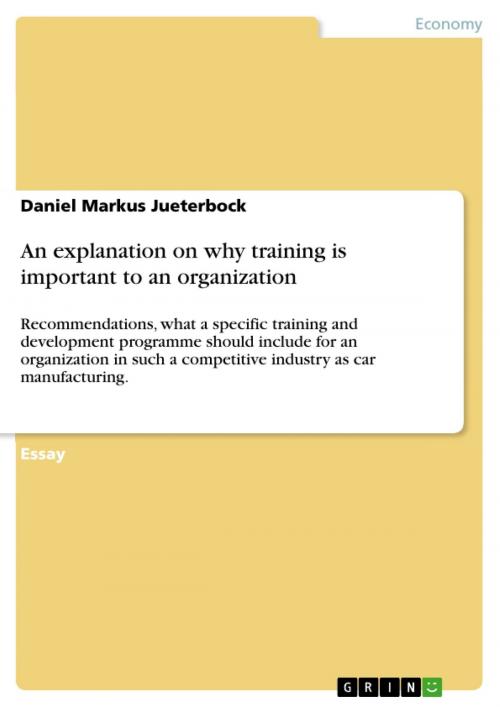An explanation on why training is important to an organization
Recommendations, what a specific training and development programme should include for an organization in such a competitive industry as car manufacturing.
Business & Finance, Human Resources & Personnel Management| Author: | Daniel Markus Jueterbock | ISBN: | 9783656181590 |
| Publisher: | GRIN Publishing | Publication: | May 2, 2012 |
| Imprint: | GRIN Publishing | Language: | English |
| Author: | Daniel Markus Jueterbock |
| ISBN: | 9783656181590 |
| Publisher: | GRIN Publishing |
| Publication: | May 2, 2012 |
| Imprint: | GRIN Publishing |
| Language: | English |
Essay from the year 2009 in the subject Business economics - Personnel and Organisation, grade: 72, Curtin University of Technology (Curtin Business School), course: Human Resource Management 200, language: English, abstract: To achieve its objectives a company needs a business strategy. It can choose between innovative prospector, quality enhancer or cost-defender strategy. According to that the firm has to apply an appropriate employment strategy. This can be the economic or the relational approach. The economic approach relies on hard skills whereas the relational approach focuses on behavioural skills. Depending on the employment strategy different ways of training and development come to mind for workers and managers. This report will explain the mentioned business strategies as well as the resulting employment strategies. Furthermore, means for training and development for non-managerial employees and for managers are explained. This report aims at giving recommendations for the automobile industry. Therefore, the successful automotive companies BMW, Daimler, Volkswagen, Chrysler and Toyota are examined according to their training and development opportunities. Further, it will be proven that the automobile industry applies the innovative prospector strategy and has the possibilities to invest heavily in human resources. This report shows that beside traditional training and development measures, corporate universities and e-learning support the innovative prospector strategy. The size of automobile companies enables them to invest in these costly measures. In the end, they will be critically evaluated and finally recommended.
Essay from the year 2009 in the subject Business economics - Personnel and Organisation, grade: 72, Curtin University of Technology (Curtin Business School), course: Human Resource Management 200, language: English, abstract: To achieve its objectives a company needs a business strategy. It can choose between innovative prospector, quality enhancer or cost-defender strategy. According to that the firm has to apply an appropriate employment strategy. This can be the economic or the relational approach. The economic approach relies on hard skills whereas the relational approach focuses on behavioural skills. Depending on the employment strategy different ways of training and development come to mind for workers and managers. This report will explain the mentioned business strategies as well as the resulting employment strategies. Furthermore, means for training and development for non-managerial employees and for managers are explained. This report aims at giving recommendations for the automobile industry. Therefore, the successful automotive companies BMW, Daimler, Volkswagen, Chrysler and Toyota are examined according to their training and development opportunities. Further, it will be proven that the automobile industry applies the innovative prospector strategy and has the possibilities to invest heavily in human resources. This report shows that beside traditional training and development measures, corporate universities and e-learning support the innovative prospector strategy. The size of automobile companies enables them to invest in these costly measures. In the end, they will be critically evaluated and finally recommended.















